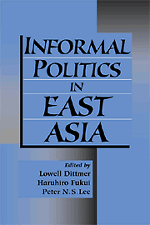Book contents
- Frontmatter
- Contents
- Preface
- Contributors
- INTRODUCTION: On the Significance of Informal Politics
- PART I Informal Politics in Industrialized Asian Democracies
- 1 The Informal Politics of Japanese Diet Elections: Cases and Interpretations
- 2 Informal Politics in Taiwan
- 3 The Election Process and Informal Politics in South Korea
- PART II Dictatorship with Chinese Characteristics: Macroperspectives
- PART III Case Studies in Chinese Corporatism
- PART IV Asian Authoritarianism on the Chinese Periphery
- CONCLUSION: East Asian Informal Politics in Comparative Perspective
- Glossary
- Index
3 - The Election Process and Informal Politics in South Korea
Published online by Cambridge University Press: 20 May 2010
- Frontmatter
- Contents
- Preface
- Contributors
- INTRODUCTION: On the Significance of Informal Politics
- PART I Informal Politics in Industrialized Asian Democracies
- 1 The Informal Politics of Japanese Diet Elections: Cases and Interpretations
- 2 Informal Politics in Taiwan
- 3 The Election Process and Informal Politics in South Korea
- PART II Dictatorship with Chinese Characteristics: Macroperspectives
- PART III Case Studies in Chinese Corporatism
- PART IV Asian Authoritarianism on the Chinese Periphery
- CONCLUSION: East Asian Informal Politics in Comparative Perspective
- Glossary
- Index
Summary
Political institutions determine economic rules in general, although the causality runs both ways. That is, property rights are determined and enforced by political institutions, but the structure of economic interests will also influence political structure. One of the most important political economic structures that has determined Korea's property rights in the past is the tightly knit relationship between the administrative branch of the government and the chaebol, the large family-owned industrial conglomerates. The organization of the Korean government endows the executive branch with special privileges that other democratic nations' governmental administrations usually do not enjoy; that is, ministries can change the rules and regulations governing commerce and other matters without the approval of the legislative branch. Using the dominant executive power, Korea's past presidents have developed personalized political exchanges to benefit specific groups. Since ministers are political appointees of the president, he has direct lines of command and authority over the ministries. Businesses and individuals with direct access to the president, therefore, have been able to get the rules and regulations changed in their favor or persuade the government to grant special privileges on their behalf. In return for extending the desired favors, the ruling party leader receives large political contributions from big businesses that he uses primarily to fund elections.
Past political economic exchanges in Korea are largely responsible for the present economic crisis that has collapsed the stock market/exchange rates and dictated the $US57 billion IMF bailout package.
- Type
- Chapter
- Information
- Informal Politics in East Asia , pp. 66 - 82Publisher: Cambridge University PressPrint publication year: 2000
- 3
- Cited by



